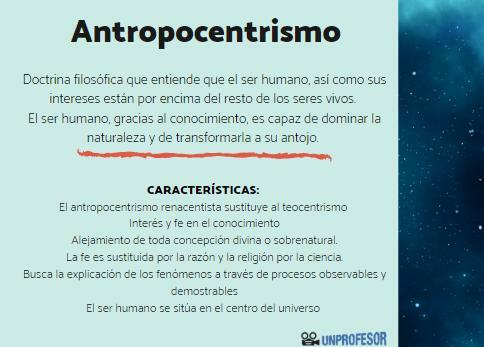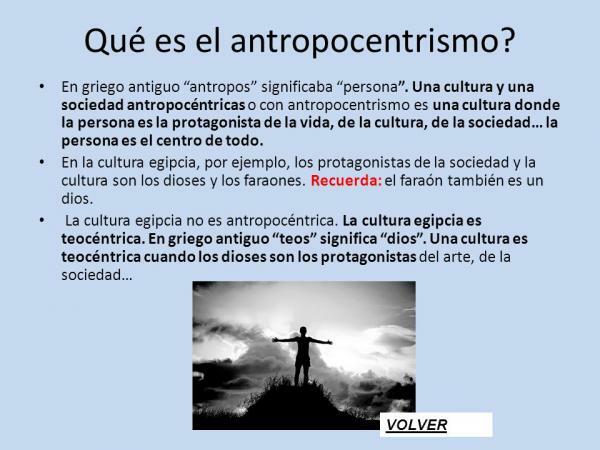ANTHROPOCENTRISM: meaning and characteristics

In this lesson from a TEACHER we explain what the meaning of anthropocentrism and its characteristics. This philosophical doctrine, framed in epistemology, understands the human being as the center of the universe. It would be, then, the measure of all things, placing their interests above those of the rest of living beings, since they are the only ones that, morally, have to be taken care of. Everything else is for the use and enjoyment of human beings, who can transform nature at will, remaining subordinate to them. It was born at the beginning of the 16th century, replacing theocentrism. If you want to know more about anthropocentrism, keep reading this article by a PROFESSOR.
Index
- Anthropocentrism meaning
- Characteristics of anthropocentrism
- Anthropocentrism VS Theocentrism
- Anthropocentrism and speciesism
Meaning of anthropocentrism.
Anthropocentrism is that philosophical doctrine that understands that the human being, as well as his interests are by
above the rest of the living beings. The human being is thus conceived as the center of the universe and to him all other creatures must be subordinated. This thought is still in force today, and that is why the pursuit of happiness, personal and social success, fame... are so important in today's society.At the same time that the human being is placed in the center, subtracting that position from God. The human being is a rational being and his capacity to knowledge, it has no limit. Thanks to the knowledge, to the science, individuals will be able to free themselves from the prejudices of religion, which is definitively separated from science.
The human being, thanks to knowledge, is capable of dominate nature and transform it at will. God no longer has a place in a world where individual, is the center of everything.

Image: Slideplayer
Characteristics of anthropocentrism.
During the Middle Ages, theocentrism was the predominant ideaand. God is at the center of the universe and is conceived as the master of it. But Renaissancesupposes a change in the way of understanding the human being, who for the first time was understood as a rational being, with an unstoppable capacity for knowledge and with the power to transform the world. There is nothing that cannot be obtained from reason. Faith in progress was unstoppable.
Below we offer you the main characteristics of anthropocentrism:
- Renaissance anthropocentrism replaces theocentrism (God is the center of the universe, a predominant idea during the Middle Ages)
- Interest and faith in knowledge, which is understood as unlimited.
- Remoteness of any divine or supernatural conception.
- Faith is replaced by reason and religion for science.
- Seeks the explanation of the phenomena through observable and demonstrable processes, and not from divine or supernatural phenomena.
- The human being is at the center of the universe and he conceives himself as an individual capable of dominating and transforming nature.
Anthropocentrism does not take into account the other living beings on the planet, since, being the only endowed with reason, he understands himself as above the rest, thus legitimizing the behavior speciesist of the current individual, who considers the human being superior to the rest of the living beings and therefore, are subject to him. Animal abuse is a direct consequence of this belief.

Anthropocentrism VS theocentrism.
The theocentrismIt is a doctrine that conceives the human being and the universe as the work of a superior being, that is, God, which is responsible for all phenomena that occur in nature. Throughout the Middle Ages, this was the prevailing idea, as the Church had great power at that time.
But with the Renaissance one arrives new understanding of the human being and the world. It begins to speak of individuals, autonomy, freedom, happiness. The human being is a rational being, unlike the rest of the living beings and is thus situated in the center of the universe, with everything else being subordinate to it. There is, then, a clear distancing from religion, which breaks his relationship with science forever.

Anthropocentrism and speciesism.
Anthropocentric ideas have survived to this day and, for that reason, everything that the human being does is by and for himself, conditioning the life on earth of the rest of the creatures, whom he tries to dominate. The human being is an individual endowed with reason, yes, but that does not place him above all other beings. The reason is simply a tool. But if we take into account the physical characteristics of people and compare them with those of other animals, we We will realize that we are at a clear disadvantage and that if reason had not provided us with weapons, we would be lost.
In the field of morality, this doctrine serves to defend the idea that human beings are the only ones with moral consideration, denying this right to the rest of the animals. The antispecistas, for their part, affirm that it is not reason, but sentience, which gives animals the right to be the object of moral consideration.
If you want to read more articles similar to Anthropocentrism: meaning and characteristics, we recommend that you enter our category of Philosophy.
Bibliography
Reale, G and Antiseri, D. History of Philosophy (Vol. II). Ed. Herder, 2010



